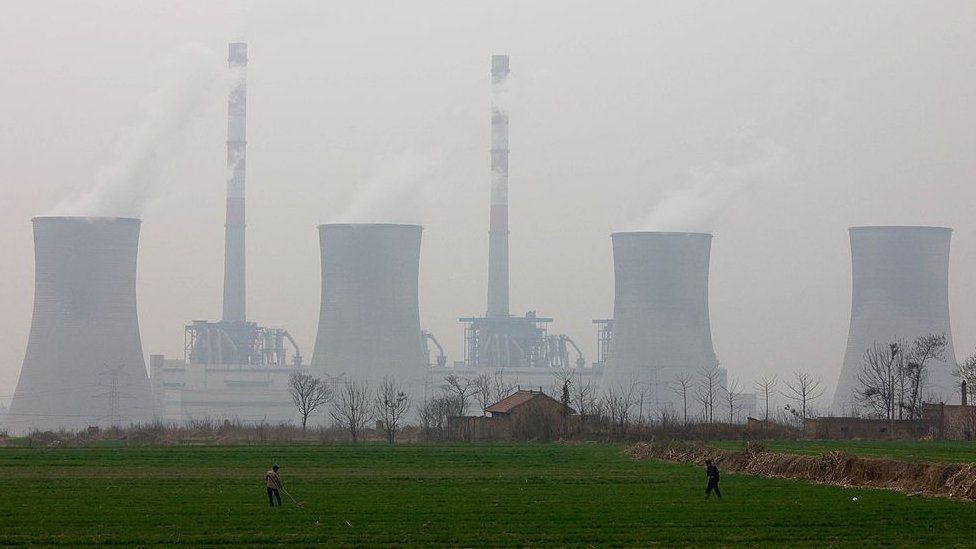Published15 hours ago
COP26

IMAGE SOURCEGETTY IMAGES
Some of the world's biggest financial institutions are working on a plan to speed the closure of coal-fired power plants in Asia, the BBC has been told.
The initiative was developed by UK insurer Prudential, is being driven by the Asian Development Bank (ADB), and includes major banks HSBC and Citi.
The ADB hopes the plan will be ready for the COP26 climate conference, which is being held in Scotland in November.
The plan aims to tackle the biggest human-made source of carbon emissions.
Don Kanak, the chairman of Prudential Insurance Growth Markets, who developed the initiative, told the BBC: "The world cannot possibly hit the Paris climate targets unless we accelerate the retirement and replacement of existing coal fired electricity, opening up much larger room in the near term for renewables and storage."
"This is especially true in Asia where existing coal fleets are big and young and will otherwise operate for decades," he added.
Under the proposal, which was first reported by the Reuters news agency, public-private partnerships will buy coal-fired plants and shut them far sooner than their usual operating lifespan.
"By purchasing a coal-fired power plant with, say, 50 years of operational life ahead of it and shutting it down within 15 years we can cut up to 35 years of carbon emission," Ahmed M Saeed, ADB's Vice President for East Asia, Southeast Asia and the Pacific said.
The ADB hopes to launch a pilot programme in a developing South East Asian nation - potentially Indonesia, the Philippines or Vietnam - in time for the COP26 event in November.
A key feature of the initiative is that it aims to raise the money for the purchases at well below the normal cost by giving lower than usual returns to investors.
Aspects of the plan that are yet to be finalised include how coal plant owners can be convinced to sell them, what to do with the plants after they are closed, and what role if any carbon credits could play.
It comes as commercial and development banks and other major investors have become increasingly reluctant to back new fossil fuel power plants as they strive to meet climate targets.
Coal-fired electricity generation accounts for about a fifth of the world's greenhouse gas emissions, making it the biggest polluter.
The International Energy Agency has forecast that global demand for coal will grow by 4.5% this year, with Asia making up 80% of that rise.
Meanwhile, the International Panel on Climate Change has called for global coal-fired electricity generation to fall from 38% to 9% by 2030.
HSBC and Citi did not immediately respond to a request for information from the BBC.

Some of the world's biggest financial institutions are working on a plan to speed the closure of coal-fired power plants in Asia, the BBC has been told.
The initiative was developed by UK insurer Prudential, is being driven by the Asian Development Bank (ADB), and includes major banks HSBC and Citi.
The ADB hopes the plan will be ready for the COP26 climate conference, which is being held in Scotland in November.
The plan aims to tackle the biggest human-made source of carbon emissions.
Don Kanak, the chairman of Prudential Insurance Growth Markets, who developed the initiative, told the BBC: "The world cannot possibly hit the Paris climate targets unless we accelerate the retirement and replacement of existing coal fired electricity, opening up much larger room in the near term for renewables and storage."
"This is especially true in Asia where existing coal fleets are big and young and will otherwise operate for decades," he added.
Under the proposal, which was first reported by the Reuters news agency, public-private partnerships will buy coal-fired plants and shut them far sooner than their usual operating lifespan.
"By purchasing a coal-fired power plant with, say, 50 years of operational life ahead of it and shutting it down within 15 years we can cut up to 35 years of carbon emission," Ahmed M Saeed, ADB's Vice President for East Asia, Southeast Asia and the Pacific said.
The ADB hopes to launch a pilot programme in a developing South East Asian nation - potentially Indonesia, the Philippines or Vietnam - in time for the COP26 event in November.
A key feature of the initiative is that it aims to raise the money for the purchases at well below the normal cost by giving lower than usual returns to investors.
Aspects of the plan that are yet to be finalised include how coal plant owners can be convinced to sell them, what to do with the plants after they are closed, and what role if any carbon credits could play.
It comes as commercial and development banks and other major investors have become increasingly reluctant to back new fossil fuel power plants as they strive to meet climate targets.
Coal-fired electricity generation accounts for about a fifth of the world's greenhouse gas emissions, making it the biggest polluter.
The International Energy Agency has forecast that global demand for coal will grow by 4.5% this year, with Asia making up 80% of that rise.
Meanwhile, the International Panel on Climate Change has called for global coal-fired electricity generation to fall from 38% to 9% by 2030.
HSBC and Citi did not immediately respond to a request for information from the BBC.

Prudential in talks to buy out and shut coal-fired plants in Asia
Scheme with Asian Development Bank could help make big progress on climate goals, says insurer
Scheme with Asian Development Bank could help make big progress on climate goals, says insurer
Jillian Ambrose
Tue 3 Aug 2021
The British insurer Prudential is working with the Asian Development Bank on a scheme to buy out coal-fired power plants in Asia in order to shut them down within 15 years.
Its backers say the plan is designed to limit use of the polluting fossil fuel while allowing workers time to find new jobs and incentivising countries to invest in clean energy alternatives.
The Guardian understands there have been “promising” early talks with Asian governments and multilateral banks about the programme, known as the “energy transition mechanism” (ETM), which could also include the banking groups HSBC, Citi and BlackRock Real Assets.
Don Kanak, the chair of Prudential Insurance Growth Markets, said that a “well funded mechanism like ETM” could help developing countries “make big progress on climate goals in the next 10-15 years, not deferring the heavy lifting until mid-century”.
“The world cannot possibly hit the Paris climate targets unless we accelerate the retirement and replacement of existing coal-fired electricity, opening up much larger room in the near term for renewables and storage,” Kanak said.
“This is especially [true] in Asia, where existing coal fleets are big and young and will otherwise operate for decades. That’s why we conceived the energy transition mechanism and worked with ADB and others to validate feasibility.”
Prudential and ADB hope to have a model ready for the UN’s Cop26 climate conference, which is being held in Glasgow in November. Alok Sharma, a former UK business secretary and now president-designate of Cop26, said he would make it a “personal priority” to consign coal to history because of the major role it plays in the climate crisis by accounting for about a fifth of the world’s greenhouse gas emissions.
Kanak added that the framework had already been presented to finance ministers from the Association of Southeast Asian Nations, the European Commission and European development officials.
A spokesperson for the ADB was not available to comment on the plans.
The potential role of big UK lenders in the scheme, first reported by Reuters, has raised eyebrows among climate campaigners because of the recent track record among many banks in financing new coal plants in Asia.
Adam McGibbon, a campaigner at Market Forces, which calls for financial institutions to use their wealth to protect the environment, said the initiative would “only have meaning if HSBC commits to no longer finance the expansion of the fossil fuel industry and phases out its fossil fuel financing in line with the goals of the Paris agreement. Otherwise, this is just HSBC trying to make money from both ends of the climate catastrophe,” he said.
HSBC has vowed to phase out coal financing by 2040 but participated earlier this year in a $400m (£290m) loan to the Indonesian coal company Adaro Energy, which produced 54m tonnes of coal in 2020.
A spokesperson for HSBC said the company “has a clear net zero ambition”.
BlackRock joins Citi to study plan to shut coal plants early
Krystal Chia, Bloomberg News
BlackRock Inc. and other major financial institutions are working on plans to accelerate the closure of coal-fired power plants in Asia in a bid to phase out the use of the worst man-made contributors to climate change.
The world’s biggest asset manager is partnering with Citigroup Inc., HSBC Holdings Plc and the Asian Development Bank to study the proposals, according to people familiar with the matter, who asked not to be named discussing a private matter. BlackRock is assessing the plans through its real assets unit, one of the people said.
The proposals, which are being led by the Asian Development Bank and Prudential Plc, involve buying coal plants in developing economies in Asia and operating them for as long as 15 years before closing the sites ahead of current schedules. The plan was first reported by Reuters.
ADB couldn’t immediately confirm the identities of the proposed partners. Representatives for Citi and BlackRock declined to comment. HSBC didn’t immediately respond to emailed requests for comment.
Even as governments set out goals to reduce greenhouse gas emissions, coal remains a principal source of energy for many countries in Asia, with China and India accounting for two-thirds of global demand. Consumption in key markets is forecast to increase for the next few years and coal-fired electricity generation could hit a record in 2022, according to the International Energy Agency.
By acquiring and running the power plants at a lower cost of capital than is currently available to commercial operators, ADB and partners would be able to generate similar returns over a shorter period, facilitating the early closures of the assets, Reuters reported.
Funding for the ADB plan is expected to come from both public and private institutions, although targets have not been set, said Ahmed M Saeed, the lender’s vice president for East Asia, Southeast Asia and the Pacific.
ADB is currently in discussions with governments in Vietnam, Indonesia and the Philippines on the proposal, and may see a pilot acquisition that is “big enough to matter” next year, Saeed said. ADB plans to start raising funds at the COP26 climate conference in November.
For the plan to be successful, it will need countries to commit to not replace eliminated coal use with other fossil fuels, said Saeed. The timeframe of 15 years will allow for sufficient planning, and will help to avoid consequences such as poor regions suddenly losing access to heating, he said.
Earlier this year, Citi met with large institutional investors in London to pitch a vehicle intended to acquire coal mines and shutter them before 2045.
No comments:
Post a Comment